Books by Thomas Strunk
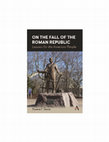
On the Fall of the Roman Republic: Lessons for the American People, 2022
Violence exploding in public spaces, corruption by political figures and economic elites, the wil... more Violence exploding in public spaces, corruption by political figures and economic elites, the will of the people thwarted in both elections and votes in the senate, military misadventures abroad, and rampant economic inequality at home diminishing a shared sense of the common good – in sum, a republic in disarray. These descriptions are not only familiar from ancient Roman political and social life but are also recognizable to any United States citizen who follows the news and American civic life. On the Republic proceeds chronologically through the fall of the Roman Republic beginning in 133 BCE and continuing down to around 14 CE, providing a continuous narrative of the fall of the Roman Republic juxtaposed with the contemporary political landscape of the United States.
On the Republic focuses on four constellations of lessons that represent the most significant things which the fall of the Roman Republic has to teach us at this time: the dangers of political violence, the inability of individuals and institutions to save us, the finality of the loss of freedom, and lastly the importance of civic virtue. In 20 short chapters, On the Republic explores how the United States now faces many of the same challenges that toppled the Roman Republic - political divisions, economic inequality, and creeping authoritarianism. How we respond to these challenges today will determine the future of American democracy.

The Roman historian Tacitus wrote a damning critique of the first century CE Roman empire. The em... more The Roman historian Tacitus wrote a damning critique of the first century CE Roman empire. The emperors in Tacitus’ works are almost universally tyrants surrounded by flatterers and informants, and the image Tacitus creates is of a society that has lost the liberty enjoyed under the Roman Republic. Yet Tacitus also poignantly depicts those who resist this tyranny and seek to restore a sense of liberty to Rome. In his portrayal of autocrats, sycophants, and republicans Tacitus provides an enduring testament to the value of liberty and the evils of despotism.
History after Liberty explores Tacitus’ political thought through his understanding of liberty. Influenced by modern republican writers such as Quentin Skinner and Philip Pettit, this study defines Tacitean libertas as the freedom from the rule of a dominus and as freedom to participate in the traditional politics of Rome through military service, public service in the senate and magistracies, and public speech. All of these elements are balanced in Tacitus’ writings with examples of those resisting the corruption of politics in an effort to restore a sense of free civic engagement. The work concludes with an exploration of Tacitus’ own writings as an act of restoring liberty. In contrast to most studies on Tacitus, History after Liberty argues that Tacitus is a republican who writes both to demonstrate that Rome had become a tyranny and to show a way out of that tyranny.
History after Liberty addresses the political thought of Tacitus’ writings. As such it will be of most interest to those who study the history and historiography of the early Roman empire, namely classicists and ancient historians. The work will also be of use to those interested in the antecedents to modern political thought, particularly the history of republicanism and freedom; readers from this category will include political scientists, philosophers, and modern historians.
Papers by Thomas Strunk
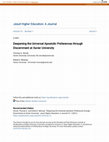
Following Fr. Arturo Sosa, S.J.’s promulgation of the Universal Apostolic Preferences (UAPs) and ... more Following Fr. Arturo Sosa, S.J.’s promulgation of the Universal Apostolic Preferences (UAPs) and as part of Xavier University’s strategic planning, the Center for Mission and Identity invited faculty and staff to participate in a semester-long Discernment Group to learn about each of the UAPs and to brainstorm ways to deepen Xavier’s expression of each, resulting in a strategic proposal (one of the President\u27s Annual Goals). Based on the principles of Ignatian Communal Discernment, the Discernment Group met throughout the Fall 2019 semester in prayerful discussion and reflection and produced documents for each of the UAPs, which were then shared and vetted by the university community. The Discernment Group concluded with the creation of a document outline Xavier’s current best practices, next steps, and aspirational goals. The work of integrating the UAPs into the life of the Xavier University is an on-going effort, which is now guided by the document – a strategic plan for the d...
Greece and Rome, Oct 1, 2012
Classical Association of the Middle West and South conference in 2010 at Oklahoma City where I re... more Classical Association of the Middle West and South conference in 2010 at Oklahoma City where I received helpful comments from the audience. I would like to thank the anonymous referee for suggesting a number of important revisions. I would also like to thank Evan Ward who served as my research assistant during the research and writing of this article.
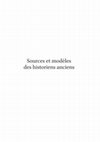
In Sources et modèles des historiens anciens. Ed. Olivier Devillers and Breno Battistin Sebastiani, 219-231. Scripta Antiqua 109. Bordeaux: Ausonius Éditions. , 2018
The emperor Augustus, though not a historian as such, had a profound understanding of how to cons... more The emperor Augustus, though not a historian as such, had a profound understanding of how to construct political events into a form a historical narrative through both architectural and epigraphic monuments. In this one way, at least, Augustus shares a resemblance with Tacitus, who took no less care in fashioning his account of the Julio-Claudians than Augustus did in designing for posterity a narrative of his reign. Although Augustus was immediately addressing a contemporary, and often local, audience with his message and Tacitus was reflecting upon past events, both of them were seeking to create an enduring message. This paper investigates particularly how Tacitus responds to the narrative that Augustus constructed through his Mausoleum and its accompanying Res Gestae.
Jesuit education is founded upon the traditions of both Ignatian spirituality and Humanism, which... more Jesuit education is founded upon the traditions of both Ignatian spirituality and Humanism, which can be
traced back to classical antiquity. The lives of St. Ignatius and Socrates are thus fundamental to learning at
Jesuit institutions, because they represent two pedagogical models by which we can come to know ourselves
and our place in the world: self-reflection through the application of the senses and philosophic inquiry in
dialogue with others. When these methods are applied to works of philosophy, literature, and art, they
provide a reflective space for self-transformation and produce a philology that is liberating.
The holding of high political office under the Principate has often been regarded as evidence for... more The holding of high political office under the Principate has often been regarded as evidence for collaboration with, or at least acceptance of, the imperial regime, as in the cases of Tacitus and Pliny. Conversely, the refusal to hold high political office or to seek to advance one’s political career has been interpreted as a mark of defiance and autonomy. In this paper, these assumptions are challenged by examining the careers of dissidents and collaborators and by exploring how the opposition could actively use the cursus honorum as a means of opposition. I conclude that a Roman’s cursus honorum does not reveal political allegiances or opinion, which especially pertains to writers like Tacitus and Pliny.
Pliny’s portrayal of his public life under Domitian has often come under fire from both those who... more Pliny’s portrayal of his public life under Domitian has often come under fire from both those who approach Pliny’s Letters from a historical perspective and those who study them as a literary production. This paper reevaluates Pliny’s experiences in five significant areas: public speaking, amicitia, political promotion, threats of political persecution, and survival and reconciliation. In all of these circumstances, Pliny is found an honest narrator of his own political struggles under Domitian and an eloquent voice for his generation’s endurance.
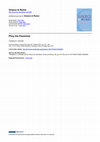
Pliny’s admiration for Nerva and Trajan and his pessimism go closely together. Under an autocrat ... more Pliny’s admiration for Nerva and Trajan and his pessimism go closely together. Under an autocrat such as Domitian, anyone could reasonably argue that if Domitian were simply removed and a more beneficent and moderate princeps come to power, then Roman society would be reinvigorated and political and literary life would undergo a renaissance. With Nerva and Trajan, indisputably wise and thoughtful principes, Romans like Pliny and Tacitus were faced with the undeniable reality that even under the best and most just principes Roman political and literary life could only be resuscitated to such a point. This is the source of Pliny’s pessimism. The position of princeps had fundamentally altered Roman society in such a way that no matter who was the princeps opportunities for demonstrating virtus through political actions were circumscribed and consequently material for authors to record displays of virtus were also limited. Pliny’s passionate words from his Panegyricus, iubes esse liberos, erimus, are revealed as hollow, not because Trajan did not indeed want his fellow Romans to be free, but rather because Trajan and his fellow Romans lived under a political system that precluded the traditional Roman idea of what it meant to be free, the realisation of which for Pliny was certainly a cause for pessimism.

The originality of Dylan's music is matched only by his
eclectic use of the Western literary and... more The originality of Dylan's music is matched only by his
eclectic use of the Western literary and musical tradition.
The inspiration of the Old and New Testaments can be felt
in almost every Dylan song from "Rainy Day Women #12 &
35" to "Slow Train Coming." The genealogy of Dylan's music has been traced by scholars like Christopher Ricks and
Michael Gray, who look to poets such as Rimbaud, Ginsberg, Keats, and indeed Henry Timrod as influences along with authors like Kerouac and Dickens. Songwriters like Hank Williams, Woody Guthrie, and countless other blues and folk musicians are recognized as direct models. The early and profound influence of folk music on Dylan's artistic development cannot be underestimated here, as the folk process encourages liberal borrowing and adaptation of earlier works. The folk process is founded on the principle of communal ownership of the artistic tradition, and it can be seen at work in Dylan's adaptation of Timrod's lyrics.
One influence, however, has eluded the ken of most commentators and critics alike: the classics. Dylan's participation in his high school's social studies club for four years seems hardly surprising, as his music is undeniably politically and socially focused. But we also know that he studied Latin in high school and was involved in the most un-hip activities of his high school's Latin club. Moreover, Dylan cites a number of ancient authors in his recent memoir Chronicles: Volume One, including Tacitus, Suetonius, Ovid, Thucydides, and Sophocles. I would like to add a few more classical authors to this list, particularly Catullus, Horace, Vergil, and Euripides, and to trace their influence on Dylan's music.
Tacitus portrays the wedding of Livia and Octavian as an abduction. His interpretation contrasts... more Tacitus portrays the wedding of Livia and Octavian as an abduction. His interpretation contrasts with the other surviving sources, which are much less hostile. Tacitus’ analysis comes into clearer focus when placed in the historiographical tradition on violence against women and political revolutions. Often violations against women were viewed as excesses of tyrannical power and resulted in the offender being exiled or murdered and in a more democratic constitution for the state. The abduction of Livia, however, coincided with a more authoritarian constitution at Rome. Tacitus’ interpretation suggests that the Romans’ passive acceptance of Octavian’s abduction of Livia inaugurated a new autocracy at Rome.
Mnemosyne, Jan 1, 2010
This paper argues that the character of Curiatius Maternus in Tacitus’ Dialogus de Oratoribus is ... more This paper argues that the character of Curiatius Maternus in Tacitus’ Dialogus de Oratoribus is consistent throughout the dialogue in his attitude to the imperial regime. Maternus begins the dialogue in outright dissent, while in the second half he appears to be an apologist for the regime. Accepting the ironic reading of Maternus’ concluding speech, this paper asserts that Maternus shifts to figured speech in reaction to M. Aper, who expresses solidarity with the political values and rhetorical style of the delatores, and Vipstanus Messalla, the half-brother of the delator M. Aquilius Regulus. Confronted with such individuals, Maternus recognizes he must change the tenor of his language. Thus, his concluding speech is ironic critique consistent with his earlier dissent.
This paper explores Tacitus’ representation of Thrasea Paetus. Preliminary to analyzing this port... more This paper explores Tacitus’ representation of Thrasea Paetus. Preliminary to analyzing this portrayal, I discuss two passages often cited when exploring Tacitus’ political thought, Agricola 42.4 and Annales 4.20. I reject the former’s validity with regard to Thrasea and accept the latter as a starting point for comparing Tacitus’ depictions of Marcus Lepidus and Thrasea. Tacitus’ characterizations of Thrasea and Lepidus share the greatest resemblance in the trials of Antistius Sosianus and Clutorius Priscus, both of whom wrote verses offensive to the regime. Thrasea and Lepidus both came to the defense of their respective poet in an attempt to spare the poet’s life. In light of these trials, I conclude that Tacitus sought to reclaim the legacy of Thrasea and to cast him anew as a principled moderate rather than a reckless dissident.
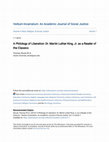
Verbum Incarnatum: An Academic Journal of Social Justice, 2010
This paper explores the intellectual relationship between Dr. Martin Luther King, Jr. and the cla... more This paper explores the intellectual relationship between Dr. Martin Luther King, Jr. and the classics, particularly the works of Plato, Sophocles, and Aeschylus. Recognizing Dr. King as a reader of the classics is significant for two reasons: the classics played a formative role in Dr. King’s development into a political activist and an intellectual of the first order; moreover, Dr. King shows us the way to read the classics. Dr. King did not read the classics in a pedantic or even academic manner, but for the purpose of liberation. Dr. King’s legacy, thus, is not merely his political accomplishments but also his example as a philologist of liberation.
There are two limitations in this work. First, I did not emphasize enough that the classics are but one small strand of influence on Dr. King. A spiritual and political leader of Dr. King’s stature cannot be reduced to one source of wisdom or one complete interpretation. I never state that the classics are the key to understanding Dr. King, but I did not sufficiently express the limit of this influence. Second, I wrote this in the heady days after President Obama’s election. I like many was elated by what had happened. I naively thought a new day had come, and in some ways a new day had come, but we have discovered that we are still tied to many of our old views on race. In being so overly optimistic about American race relations, I revealed my own ties to old views on race. I should have known better that racism will not end simply because individuals have achieved a certain place in society. I think we should all continue to take joy in the election and presidency of Barack Obama, but we also need to roll up sleeves and continue the hard work of dismantling white supremacy in the United States.
Conference Presentations by Thomas Strunk
Classical Association of the Middle-West and SouthE. , 2015
Book Reviews by Thomas Strunk
Classical Journal - Online, 2020
Strunk review of Christopher Whitton, ed., Pliny the Younger Epistles Book II. Journal of Roman Studies 2015.











Uploads
Books by Thomas Strunk
On the Republic focuses on four constellations of lessons that represent the most significant things which the fall of the Roman Republic has to teach us at this time: the dangers of political violence, the inability of individuals and institutions to save us, the finality of the loss of freedom, and lastly the importance of civic virtue. In 20 short chapters, On the Republic explores how the United States now faces many of the same challenges that toppled the Roman Republic - political divisions, economic inequality, and creeping authoritarianism. How we respond to these challenges today will determine the future of American democracy.
History after Liberty explores Tacitus’ political thought through his understanding of liberty. Influenced by modern republican writers such as Quentin Skinner and Philip Pettit, this study defines Tacitean libertas as the freedom from the rule of a dominus and as freedom to participate in the traditional politics of Rome through military service, public service in the senate and magistracies, and public speech. All of these elements are balanced in Tacitus’ writings with examples of those resisting the corruption of politics in an effort to restore a sense of free civic engagement. The work concludes with an exploration of Tacitus’ own writings as an act of restoring liberty. In contrast to most studies on Tacitus, History after Liberty argues that Tacitus is a republican who writes both to demonstrate that Rome had become a tyranny and to show a way out of that tyranny.
History after Liberty addresses the political thought of Tacitus’ writings. As such it will be of most interest to those who study the history and historiography of the early Roman empire, namely classicists and ancient historians. The work will also be of use to those interested in the antecedents to modern political thought, particularly the history of republicanism and freedom; readers from this category will include political scientists, philosophers, and modern historians.
Papers by Thomas Strunk
traced back to classical antiquity. The lives of St. Ignatius and Socrates are thus fundamental to learning at
Jesuit institutions, because they represent two pedagogical models by which we can come to know ourselves
and our place in the world: self-reflection through the application of the senses and philosophic inquiry in
dialogue with others. When these methods are applied to works of philosophy, literature, and art, they
provide a reflective space for self-transformation and produce a philology that is liberating.
eclectic use of the Western literary and musical tradition.
The inspiration of the Old and New Testaments can be felt
in almost every Dylan song from "Rainy Day Women #12 &
35" to "Slow Train Coming." The genealogy of Dylan's music has been traced by scholars like Christopher Ricks and
Michael Gray, who look to poets such as Rimbaud, Ginsberg, Keats, and indeed Henry Timrod as influences along with authors like Kerouac and Dickens. Songwriters like Hank Williams, Woody Guthrie, and countless other blues and folk musicians are recognized as direct models. The early and profound influence of folk music on Dylan's artistic development cannot be underestimated here, as the folk process encourages liberal borrowing and adaptation of earlier works. The folk process is founded on the principle of communal ownership of the artistic tradition, and it can be seen at work in Dylan's adaptation of Timrod's lyrics.
One influence, however, has eluded the ken of most commentators and critics alike: the classics. Dylan's participation in his high school's social studies club for four years seems hardly surprising, as his music is undeniably politically and socially focused. But we also know that he studied Latin in high school and was involved in the most un-hip activities of his high school's Latin club. Moreover, Dylan cites a number of ancient authors in his recent memoir Chronicles: Volume One, including Tacitus, Suetonius, Ovid, Thucydides, and Sophocles. I would like to add a few more classical authors to this list, particularly Catullus, Horace, Vergil, and Euripides, and to trace their influence on Dylan's music.
There are two limitations in this work. First, I did not emphasize enough that the classics are but one small strand of influence on Dr. King. A spiritual and political leader of Dr. King’s stature cannot be reduced to one source of wisdom or one complete interpretation. I never state that the classics are the key to understanding Dr. King, but I did not sufficiently express the limit of this influence. Second, I wrote this in the heady days after President Obama’s election. I like many was elated by what had happened. I naively thought a new day had come, and in some ways a new day had come, but we have discovered that we are still tied to many of our old views on race. In being so overly optimistic about American race relations, I revealed my own ties to old views on race. I should have known better that racism will not end simply because individuals have achieved a certain place in society. I think we should all continue to take joy in the election and presidency of Barack Obama, but we also need to roll up sleeves and continue the hard work of dismantling white supremacy in the United States.
Conference Presentations by Thomas Strunk
Book Reviews by Thomas Strunk
On the Republic focuses on four constellations of lessons that represent the most significant things which the fall of the Roman Republic has to teach us at this time: the dangers of political violence, the inability of individuals and institutions to save us, the finality of the loss of freedom, and lastly the importance of civic virtue. In 20 short chapters, On the Republic explores how the United States now faces many of the same challenges that toppled the Roman Republic - political divisions, economic inequality, and creeping authoritarianism. How we respond to these challenges today will determine the future of American democracy.
History after Liberty explores Tacitus’ political thought through his understanding of liberty. Influenced by modern republican writers such as Quentin Skinner and Philip Pettit, this study defines Tacitean libertas as the freedom from the rule of a dominus and as freedom to participate in the traditional politics of Rome through military service, public service in the senate and magistracies, and public speech. All of these elements are balanced in Tacitus’ writings with examples of those resisting the corruption of politics in an effort to restore a sense of free civic engagement. The work concludes with an exploration of Tacitus’ own writings as an act of restoring liberty. In contrast to most studies on Tacitus, History after Liberty argues that Tacitus is a republican who writes both to demonstrate that Rome had become a tyranny and to show a way out of that tyranny.
History after Liberty addresses the political thought of Tacitus’ writings. As such it will be of most interest to those who study the history and historiography of the early Roman empire, namely classicists and ancient historians. The work will also be of use to those interested in the antecedents to modern political thought, particularly the history of republicanism and freedom; readers from this category will include political scientists, philosophers, and modern historians.
traced back to classical antiquity. The lives of St. Ignatius and Socrates are thus fundamental to learning at
Jesuit institutions, because they represent two pedagogical models by which we can come to know ourselves
and our place in the world: self-reflection through the application of the senses and philosophic inquiry in
dialogue with others. When these methods are applied to works of philosophy, literature, and art, they
provide a reflective space for self-transformation and produce a philology that is liberating.
eclectic use of the Western literary and musical tradition.
The inspiration of the Old and New Testaments can be felt
in almost every Dylan song from "Rainy Day Women #12 &
35" to "Slow Train Coming." The genealogy of Dylan's music has been traced by scholars like Christopher Ricks and
Michael Gray, who look to poets such as Rimbaud, Ginsberg, Keats, and indeed Henry Timrod as influences along with authors like Kerouac and Dickens. Songwriters like Hank Williams, Woody Guthrie, and countless other blues and folk musicians are recognized as direct models. The early and profound influence of folk music on Dylan's artistic development cannot be underestimated here, as the folk process encourages liberal borrowing and adaptation of earlier works. The folk process is founded on the principle of communal ownership of the artistic tradition, and it can be seen at work in Dylan's adaptation of Timrod's lyrics.
One influence, however, has eluded the ken of most commentators and critics alike: the classics. Dylan's participation in his high school's social studies club for four years seems hardly surprising, as his music is undeniably politically and socially focused. But we also know that he studied Latin in high school and was involved in the most un-hip activities of his high school's Latin club. Moreover, Dylan cites a number of ancient authors in his recent memoir Chronicles: Volume One, including Tacitus, Suetonius, Ovid, Thucydides, and Sophocles. I would like to add a few more classical authors to this list, particularly Catullus, Horace, Vergil, and Euripides, and to trace their influence on Dylan's music.
There are two limitations in this work. First, I did not emphasize enough that the classics are but one small strand of influence on Dr. King. A spiritual and political leader of Dr. King’s stature cannot be reduced to one source of wisdom or one complete interpretation. I never state that the classics are the key to understanding Dr. King, but I did not sufficiently express the limit of this influence. Second, I wrote this in the heady days after President Obama’s election. I like many was elated by what had happened. I naively thought a new day had come, and in some ways a new day had come, but we have discovered that we are still tied to many of our old views on race. In being so overly optimistic about American race relations, I revealed my own ties to old views on race. I should have known better that racism will not end simply because individuals have achieved a certain place in society. I think we should all continue to take joy in the election and presidency of Barack Obama, but we also need to roll up sleeves and continue the hard work of dismantling white supremacy in the United States.
À partir des cultures européenne et américaine du xviiie siècle et de contextes particuliers où fleurit d’une manière nouvelle la passion pour le collectionnisme, ce volume entend vérifier la façon dont le siècle des Lumières a contribué à la modélisation de la Rome antique et de ses institutions.
__________________________
https://classiques-garnier.com/index.php/regards-croises-sur-la-rome-ancienne-et-les-lumieres.html
TABLE DES MATIÈRES
- Ida Gilda Mastrorosa, Introduction. En revenant sur Rome par des chemins différents
I - LA MODÉLISATION DES PROTAGONISTES
- Thomas E. Strunk, Cato of Utica on the 18th Century Stage
- Ida Gilda Mastrorosa, Pompée stratège de la dissimulation pendant le siècle des Lumières. Les reproches parallèles de Montesquieu et de Mably
- M. Stefania Montecalvo, Le baron de Sainte-Croix et l’empire. Les pouvoirs d’Auguste entre dissimulation et réalité historique
- Umberto Roberto, Dioclétien, empereur philosophe. À propos de quelques articles du Dictionnaire philosophique (1764) de Voltaire
- Stefano Trovato, Julian: model of tolerance for the Enlightenment or a blood-thirsty persecutor for Christian apologists?
-- II LOIS, RELIGION ET POLITIQUE. LA MISE EN PLACE DE LA MÉMOIRE CULTURELLE
- Katherine East, Federico Santangelo, Ancient Gods and Enlightenment Theories of , Idolatry. John Toland’s Third Letter to Serena
- Jean-Jacques Tatin-Gourier, L’opinion publique, la calomnie et la mémoire dans l’Essai sur les règnes de Claude et de Néron et sur les moeurs et les écrits de Sénèque (1782)
- Daniel Kapust, Three Images of Rome. Republicanism, History, and the American Experiment in Mercy Otis Warren’s History of the Rise, Progress, and Termination of the American Revolution
- Carlo Pelloso, Tribunes and Negative Sovereignty in Rousseau’s The Social Contract
- Damien Crelier, Historiographie et profondeur. Des arcana imperii de Tacite au projet de « dévoilement» de Saint-Simon
-- III. - NOSTALGIES D’ANTIQUITÉS
- Marco Cavalieri, “Velleja […] est une des curiosités de ce siècle”. The Antiquitates of Veleia: collecting, archaeology and politics between Italy and France in the xviii century
- Irene Favaretto, Collections d’antiquités et leur espace. Aménagements et décors dans les collections vénitiennes du XVIIIe siècle
- François Pugnière, Héritage antique et identité urbaine. Nîmes au siècle des Lumières